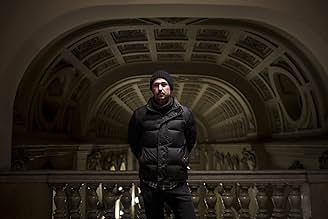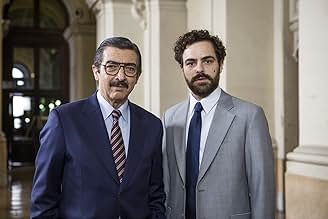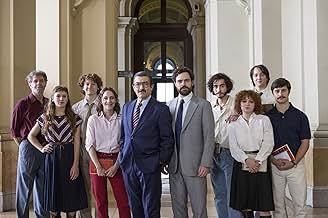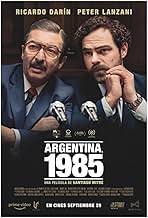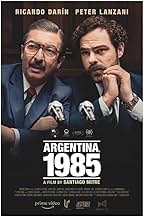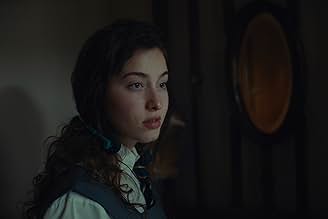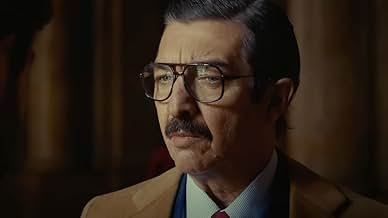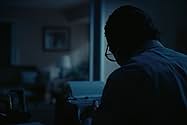IMDb-BEWERTUNG
7,6/10
34.627
IHRE BEWERTUNG
A team of lawyers take on the heads of Argentina's bloody military dictatorship during the 1980s in a battle against odds and a race against time.A team of lawyers take on the heads of Argentina's bloody military dictatorship during the 1980s in a battle against odds and a race against time.A team of lawyers take on the heads of Argentina's bloody military dictatorship during the 1980s in a battle against odds and a race against time.
- Regie
- Drehbuch
- Hauptbesetzung
- Für 1 Oscar nominiert
- 49 Gewinne & 45 Nominierungen insgesamt
Gabriel Martín Fernández
- Bruzzo
- (as Gabriel Fernández)
Zusammenfassung
Reviewers say 'Argentina, 1985' is a powerful film exploring Argentina's military dictatorship trial. It is lauded for strong performances, especially Ricardo Darín, and its emotional engagement. Critics appreciate the balance of tension, humor, and historical accuracy, though some find lacking depth in character development and context. The cinematography and direction effectively capture the era's atmosphere. Despite minor critiques on pacing and bias, it is seen as an important, impactful work resonating with audiences familiar with Argentina's history.
Empfohlene Bewertungen
It's not easy to talk about one of the darkest periods in Argentina's history - including torture, rapes and deaths - and to do it in an appealing way that doesn't become too heavy or exploit the victims' suffering in an abusive way. It's not easy, but they did it.
The script by Llinás and Miter is quite refined, careful and intelligent in the way it addresses all the atrocities of the regime, always saying what it has to say, but it is also intelligent in the way it incorporates moments of humour, a personal and familiar dimension that helps us to identify with the characters, being able to transform everything that happened in one of the most important judgments in history into hope and a turning point. I'm not Argentine. I'm not an easy tear person. However, it is difficult to contain emotions in certain depositions or when in his closing arguments, prosecutor Straessera says "Nunca más" (Never Again). People who have lived under dictatorial regimes or who have heard the stories told by their parents or grandparents cannot remain indifferent to such a moment.
Santiago Miter's direction is super smart too. It's filmed soberly when necessary. It's filmed using movement and different techniques when the action requires it, such as in moments of greater tension, such as during a harrowing dinner with the Assistant Attorney, Luis Moreno Ocampo. The editing is also very efficient, helping a 140-minute film on such a heavy topic - and with much of its time spent in an investigation or in court - pass quickly, using several scenes on the screen at the same time, resorting to overlapping voices and testimonies, resorting to music whenever the film has something to extract from it, not seeming to do anything by chance.
Finally, it is impossible not to mention the excellent actors who make this film. All the supporting actors are at a good level, but the dynamic between Ricardo Darin (as the Attorney General) and Peter Lanzani (as the Assistant Attorney) is one of the highlights, always seeming true and honest, being easy to sympathize and cheer for those characters. Darin could very well have taken a more showy approach, but it is his sobriety and distinct personality that are his greatest strengths.
A must-see film for anyone who cares about the human condition and dignity. A film that recalls that certain pages of history must never be lived again. Nunca más!
The script by Llinás and Miter is quite refined, careful and intelligent in the way it addresses all the atrocities of the regime, always saying what it has to say, but it is also intelligent in the way it incorporates moments of humour, a personal and familiar dimension that helps us to identify with the characters, being able to transform everything that happened in one of the most important judgments in history into hope and a turning point. I'm not Argentine. I'm not an easy tear person. However, it is difficult to contain emotions in certain depositions or when in his closing arguments, prosecutor Straessera says "Nunca más" (Never Again). People who have lived under dictatorial regimes or who have heard the stories told by their parents or grandparents cannot remain indifferent to such a moment.
Santiago Miter's direction is super smart too. It's filmed soberly when necessary. It's filmed using movement and different techniques when the action requires it, such as in moments of greater tension, such as during a harrowing dinner with the Assistant Attorney, Luis Moreno Ocampo. The editing is also very efficient, helping a 140-minute film on such a heavy topic - and with much of its time spent in an investigation or in court - pass quickly, using several scenes on the screen at the same time, resorting to overlapping voices and testimonies, resorting to music whenever the film has something to extract from it, not seeming to do anything by chance.
Finally, it is impossible not to mention the excellent actors who make this film. All the supporting actors are at a good level, but the dynamic between Ricardo Darin (as the Attorney General) and Peter Lanzani (as the Assistant Attorney) is one of the highlights, always seeming true and honest, being easy to sympathize and cheer for those characters. Darin could very well have taken a more showy approach, but it is his sobriety and distinct personality that are his greatest strengths.
A must-see film for anyone who cares about the human condition and dignity. A film that recalls that certain pages of history must never be lived again. Nunca más!
I've been looking forward to this film for a long time, and it doesn't disappoint at all. It's the kind of movie where the performances carry all the weight. Ricardo Darin as always was superb, but also Alejandra Flechner shines as the prosecutor's wife.
While the film has the familiar structure of a trial movie, everything is executed flawlessly.
Merits aside, the whole technical section, from minute zero, is absolutely surprising, the budget is noticeable. I recommend watching it on the big screen, it is unmissable to see the audience's reaction throughout the film. It'll probably be on of the five nominees at the Oscar´s for best international film.
While the film has the familiar structure of a trial movie, everything is executed flawlessly.
Merits aside, the whole technical section, from minute zero, is absolutely surprising, the budget is noticeable. I recommend watching it on the big screen, it is unmissable to see the audience's reaction throughout the film. It'll probably be on of the five nominees at the Oscar´s for best international film.
Argentina, 1985 is inspired by the true story of the prosecutors Julio Strassera and Luis Moreno Ocampo, who in 1985 dared to investigate and prosecute those responsible for the bloodiest phase of the Argentine military dictatorship, which fell only 2 years earlier. Without being intimidated by the regime, the expert Strassera and the young Moreno Ocampo formed a young legal team of unlikely heroes to wage an unequal battle.
Constantly threatened, together with their families, they fought against time to give justice to the victims of the military junta which in 1976 deposed Isabelita Martinez De Peron in a coup. The members of the junta were tried for crimes committed by the Armed Forces in those years, which resulted in over 30,000 disappeared in December 1985, many were sentenced to life imprisonment. The film has the advantage of effectively reconstructing, in the same places where the facts took place, the difficult investigative work and the four-month trial with 833 eyewitnesses and survivors of clandestine detention and torture centers.
Also using a surprisingly humorous tone, which makes the magistrate (played by an extraordinary Ricardo Darìn) more human, likeable his very young group of lawyers and affectionate his beautiful family reveals the private side of an honest man. The 1985 trial allowed the Argentine justice to recognize and reclaim a long denied right. It inaugurates democracy and condemns the use of violence as a possibility.
When state terrorism takes hold in society, there is always an attempt to annihilate citizens and eliminate the possibility of communication.
Constantly threatened, together with their families, they fought against time to give justice to the victims of the military junta which in 1976 deposed Isabelita Martinez De Peron in a coup. The members of the junta were tried for crimes committed by the Armed Forces in those years, which resulted in over 30,000 disappeared in December 1985, many were sentenced to life imprisonment. The film has the advantage of effectively reconstructing, in the same places where the facts took place, the difficult investigative work and the four-month trial with 833 eyewitnesses and survivors of clandestine detention and torture centers.
Also using a surprisingly humorous tone, which makes the magistrate (played by an extraordinary Ricardo Darìn) more human, likeable his very young group of lawyers and affectionate his beautiful family reveals the private side of an honest man. The 1985 trial allowed the Argentine justice to recognize and reclaim a long denied right. It inaugurates democracy and condemns the use of violence as a possibility.
When state terrorism takes hold in society, there is always an attempt to annihilate citizens and eliminate the possibility of communication.
The movie starts pretty slow, but from the beginning on you can connect with the characters. The first half hour or so has A LOT of funny little moments, maybe even one or two to many, considering the tone and themes of the movie, but it still works somehow, especially because the actors do a very good job(Important sidenote: I watched it in the original language with subtitles).
The movie lacks a bit of structure though, and the first half feels a bit long and stretched in some parts, it doesn't really feel like we are getting somewhere anytime soon. But it picks up in the second half! What still lacks is real tension. BUT there are a lot of very powerful moments near the end, spectacularly delivered by the cast.
You should also not expect thorough explanations of argentinian history or the court case itself, the movie is about people fighting for justice and shows there struggles and emotions.
So if you want to see an emotional, yet funny, movie with some real heart, and you bring some patience with you, I can really recommend it!
The movie lacks a bit of structure though, and the first half feels a bit long and stretched in some parts, it doesn't really feel like we are getting somewhere anytime soon. But it picks up in the second half! What still lacks is real tension. BUT there are a lot of very powerful moments near the end, spectacularly delivered by the cast.
You should also not expect thorough explanations of argentinian history or the court case itself, the movie is about people fighting for justice and shows there struggles and emotions.
So if you want to see an emotional, yet funny, movie with some real heart, and you bring some patience with you, I can really recommend it!
A bracingly riveting legal drama that sheds informative light on the historic Trial of the Juntas and the painstaking work that went into its preparation, Argentina, 1985 narrates the strategy of the attorney chosen to prosecute the ones responsible for the bloodiest dictatorship in Argentine history. Smartly crafted & strongly acted, the film is engrossing for the most part yet not realised to its full potential.
Co-written & directed by Santiago Mitre, the story covers the legal challenges & constant death threats that the lead prosecutor faces along with his personal demons while preparing the case. The courtroom proceedings are shot with finesse, those real-life testimonies provide a powerful, disturbing & heartbreaking account of the brutality of the dictatorial regime and they happen to be provocative enough to rile up viewers' emotions.
Despite the grim subject matter, humour surfaces on screen in the most unlikely of ways and is effectively carried out. But the plot also loses momentum every time it shifts focus from the main event to protagonist's own family life. Also, the prosecution team hardly faces any friction in the courtroom, for the back-n-forth plays that make this genre so captivating is missing here. But as expected, Ricardo Darín leads from the front with an assured input.
Overall, Argentina, 1985 illustrates the political climate of its period setting in meticulous detail and makes for a gripping dramatisation of a vital slice of Argentine history. Still, there was more up for grabs as despite the 140 mins runtime, the film feels like a surface level exploration than an in-depth investigation. Strengthened by top-notch performances from its cast & first-rate work from the crew, this Argentine offering ranks amongst the better films of 2022 and is a must-see.
Co-written & directed by Santiago Mitre, the story covers the legal challenges & constant death threats that the lead prosecutor faces along with his personal demons while preparing the case. The courtroom proceedings are shot with finesse, those real-life testimonies provide a powerful, disturbing & heartbreaking account of the brutality of the dictatorial regime and they happen to be provocative enough to rile up viewers' emotions.
Despite the grim subject matter, humour surfaces on screen in the most unlikely of ways and is effectively carried out. But the plot also loses momentum every time it shifts focus from the main event to protagonist's own family life. Also, the prosecution team hardly faces any friction in the courtroom, for the back-n-forth plays that make this genre so captivating is missing here. But as expected, Ricardo Darín leads from the front with an assured input.
Overall, Argentina, 1985 illustrates the political climate of its period setting in meticulous detail and makes for a gripping dramatisation of a vital slice of Argentine history. Still, there was more up for grabs as despite the 140 mins runtime, the film feels like a surface level exploration than an in-depth investigation. Strengthened by top-notch performances from its cast & first-rate work from the crew, this Argentine offering ranks amongst the better films of 2022 and is a must-see.
Wusstest du schon
- WissenswertesAfter winning the Golden Globe for best non-English language film, fellow actor Peter Lanzani revealed that Ricardo Darín used his "lucky charm" for awards ceremonies and told the cast and crew to think, "Don't worry, we're not going to win, we have no chance, we're losers, be calm, we won't have to make a speech, we won't win."
- Patzer(at around 43 mins) The taxis of the time had a logo in the shape of a circle with an identification number on the front door. In this scene the taxis don't have any logo except the taxi sign on the roof.
- Zitate
Julio César Strassera: History was not made by guys like me.
- Crazy CreditsPhotographs from the trial are shown in the credits.
- VerbindungenFeatured in Javo & Temoc: Top 10 Películas: Lo "mejor" del año (2022)
- SoundtracksSalir de la melancolía
Written by Charly García (as Carlos Alberto 'Charly' García)
Performed by Serú Girán
Top-Auswahl
Melde dich zum Bewerten an und greife auf die Watchlist für personalisierte Empfehlungen zu.
- How long is Argentina, 1985?Powered by Alexa
Details
- Erscheinungsdatum
- Herkunftsländer
- Sprachen
- Auch bekannt als
- Argentina, 1985
- Drehorte
- Produktionsfirmen
- Weitere beteiligte Unternehmen bei IMDbPro anzeigen
Box Office
- Weltweiter Bruttoertrag
- 905.893 $
- Laufzeit
- 2 Std. 20 Min.(140 min)
- Farbe
- Seitenverhältnis
- 1.50 : 1
Zu dieser Seite beitragen
Bearbeitung vorschlagen oder fehlenden Inhalt hinzufügen







